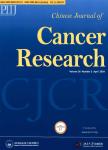GROWTH INHIBITION OF HUMAN LARYNGEAL CANCER CELL WITH THE ADENOVIRUS-MEDIATED p53 GENE
GROWTH INHIBITION OF HUMAN LARYNGEAL CANCER CELL WITH THE ADENOVIRUS-MEDIATED p53 GENE作者机构:Department of Otolaryngology-Head and Neck Surgery Institute of Otolaryngology Beijing Tongren Hospital Capital University of Medical Sciences Beijing China
出 版 物:《Chinese Journal of Cancer Research》 (中国癌症研究(英文版))
年 卷 期:1999年第11卷第3期
页 面:157-160页
核心收录:
学科分类:1002[医学-临床医学] 100214[医学-肿瘤学] 10[医学]
基 金:国家自然科学基金
主 题:Gene therapy Laryngeal cancer p53 gene Adenoviruses
摘 要:Objective: In most laryngeal cancers, the function of p53 gene is down regulated. To explore the potential use of p53 in gene therapy of laryngeal cancer, by introducing wild-type p53 into laryngeal cancer cell line via a recombinant adenoviral vector, Ad5CMV-p53 and analyzing its effects on cell and tumor growth. Methods: A human laryngeal cancer, cell line Hep-2 was used. Recombinant cytomegalovirus-promoted adenoviruses containing human wild-type p53 cDNA was transiently introduced into Hep-2 line. The growth suppression of the Hep-2 cells and established s.c. squamous, carcinoma model was examined. The p53 protein expression was detected using immunohistochemical analysis. Results: The transduction efficiencies of Hep-2 cell line were 100% at a multiplicity of 100 or greater. The p53 protein expression peaked on day 2 after infection and lasted far 5 days. In vitro growth assays revealed cell death following Ad5CMV-p53 infected. In vivo studies, Ad5CMV-p53 inhibited the tumorigenicity of Hep-2 cell, and in nude mice with established s.c. squamous, carcinoma, nodules showed that tumor volumes were significantly reduced in mice that received peritumoral infiltration of Ad5CMV-p53. Conclusion: Adenovirus-mediated antitumor therapy carrying the p53 gene is an efficient method to inhibit laryngeal cancer growth. Transfection of laryngeal cancer cells with the wild-type p53 gene via Ad5CMV-p53 is a potential novel approach to the therapy of laryngeal cancer.



